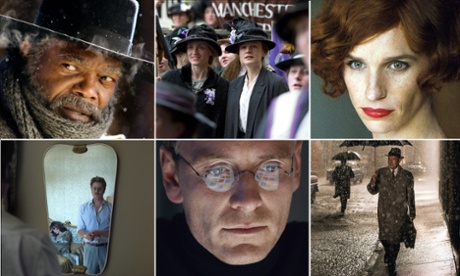The sure bets
The Birth of a Nation
In the wake of the #OscarsSoWhite controversy and the surge of the Black Lives Matter movement, no film is more poised to capture the zeitgeist this season than The Birth of a Nation, Nate Parker’s directorial debut centered on the story of Nat Turner, a former slave who led a violent liberation movement in 1831 to free African Americans in Virginia.
Although critical reaction has been decidedly mixed (the Guardian’s Lanre Bakare called it “heavy-handed”, while Variety’s Justin Chang praised it as “searingly impressive”), it caused a total sensation at Sundance in January, after it sold for a festival-record $17.5m to Fox Searchlight (the distribution company behind former best picture winners 12 Years a Slave and Birdman), and won the event’s coveted grand jury prize, as well as the audience award.
A stirring trailer has already been making the rounds, launching the film’s awards campaign and making the October release one of the most anticipated of the fall. Potential backlash from some critics who have yet to see it would dampen some of the buzz – but the timely subject matter coupled with passionate audience approval could take this ambitious epic the distance.
Florence Foster Jenkins
If there’s one thing the Academy loves, it’s a grand lead performance from perennial Oscar favorite Meryl Streep. She delivers just that in Florence Foster Jenkins, playing the titular New York heiress who dreamed of becoming an opera singer, despite a lack of talent.
Having already opened in most of Europe, Florence Foster Jenkins screened early for US critics ahead of its stateside August release to drum up awards chatter. The gamble paid off, with major Hollywood trades like Variety and the Hollywood Reporter predicting a record 20th nomination for Streep.
Not to be discounted is Hugh Grant, playing Streep’s doting onscreen husband in the film. The actor matches her every step of the way, to deliver one of his most nuanced performances.
Manchester By the Sea
Like The Birth of a Nation, Kenneth Lonergan’s devastating drama Manchester By the Sea (his first since 2011’s Margaret), sold big at Sundance thanks to the deafening awards buzz it was immediately greeted with. Unlike Parker’s period drama, it premiered to near-unanimous ecstatic word of mouth.
Still, it faces a bigger uphill battle than The Birth of a Nation, chiefly because like all of Lonergan’s output, it’s small-scaled and challenging.
The film’s best bets lie in the wrenching performances from Casey Affleck, who plays a janitor reeling from a family tragedy, and Michelle Williams, as Affleck’s grieving ex-wife. She only factors into a handful of scenes but stuns in a pivotal sequence, making her an early lock for a best supporting actress nomination.
Zootopia
It’s rare for animated films to break into major Oscar categories, save for best animated feature. If there’s one release to buck that trend this year, Disney’s Zootopia has the best early shot.
A runaway hit with audiences (it’s currently the second highest-grossing film worldwide, after crossing the $1bn mark this spring), critics are equally enamored – it boasts a 98% fresh score on Rotten Tomatoes.
Pixar has Finding Dory – and although bound to eclipse Zootopia’s final tally (it opened to record-breaking numbers over the weekend), it’s not as sophisticated as Toy Story 3 or Up, both of which went on to earn best picture nominations, on top of winning in their respective field, for the animation studio. Zootopia meanwhile tackles a litany of social justice issues, coyly addressing race relations in America and police brutality, while still maintaining a true sense of fun.
The definite possibilities
A Bigger Splash
Tilda Swinton is beguiling as always in A Bigger Splash, a sexy and sinister psychological thriller that reunites her with her I Am Love director Luca Guadagnino. Ralph Fiennes, however, has the showier role as a motormouth producer-promoter type and former partner of Swinton’s Bowie-like rock star. The two-time Oscar nominee is a strong contender for a supporting actor nod.
Hello, My Name is Doris
Sally Field is a blast in Hello, My Name is Doris, giving one of the best and most spry performances of her career as a 60-year-old who sparks up an unlikely courtship with a much younger co-worker. The film has struck a nerve with audiences, grossing over $14m at the domestic box office (a huge number considering it was made for only $1m) to become the biggest hit to ever emerge out of the SXSW film festival. The Academy is likely to respond just as warmly to Field’s rare lead turn.
I, Daniel Blake
Despite winning two Palme d’Or awards and countless other accolades, Ken Loach has never won an Oscar. I, Daniel Blake, his most nakedly emotional film in years, could possibly rectify that. The film, about an unemployed carpenter attempting to claim benefits through a welfare system that’s designed to trip him at every turn, was by no means favored to triumph at this year’s Cannes, with pundits predicting the jury would award German comedy Toni Erdmann over Loach’s welfare drama. Its surprise win testifies to its power.
The Jungle Book
Disney’s recent live-action remakes of its animated classics have been generally well-liked. Still, few could have predicted the praise lavished upon The Jungle Book.
Jon Favreau’s ambitious mounting of Rudyard Kipling’s children’s adventure was a hit out of the gate, stampeding to a huge $103.6m opening in the US, and going to on to gross close to $1bn worldwide. Its lasting success at the box office can no doubt be attributed to strong reviews (the Guardian’s Peter Bradshaw praised it as a “spectacular revival”) and positive word of mouth.
Last year, the Academy proved it’s not immune to rewarding hugely commercial fare, granted the films are as well liked as Mad Max: Fury Road and The Martian. With its groundbreaking visuals, epic scope and buoyant energy, The Jungle Book could join those ranks.
The Lobster
The Lobster is defiantly strange and tough to categorize, so therefore not to the Academy’s liking? Not so quick. While the Academy is known for rewarding run-of-the-mill dramas that play to the widest demographic, like The Blind Side and Driving Miss Daisy, its members also frequently are drawn to eclectic, more experimental fare like best picture winner Birdman. Yorgos Lanthimos’s English language debut is just that, taking place in a dystopian society where single people must find a mate within 45 days or be transformed into an animal of their choice. Most importantly, The Lobster is one of biggest independent hits of the year, proving that its bizarre concept is not alienating, but enticing.
Loving
No film entered Cannes this year with more Oscar hopes than Loving, Jeff Nichols’s biopic of Richard and Mildred Loving, a white man and a black woman who were arrested in Virginia in 1958 for marrying. While generally admired by critics, the drama, which opens in November during the heat of awards season, is notably muted in tone, despite its timely subject matter following the legalization of gay marriage in America. It lacks the urgency that caused The Birth of a Nation to catch fire in Sundance, and therefore might have trouble winning over the Academy. Out of the stellar cast, relative unknown Ruth Negga stands out for her piercing portrayal of Mildred.
The should-be contenders
Aquarius
Were Aquarius in English, Braga would be a shoo-in for a nomination. She’s fiery and commanding as a fiercely resilient ageing music critic eager to remain in her apartment despite developers’ pressure, in Brazilian writer-director Kleber Mendonça Filho’s fiery drama. On rare occasion, the Academy widens the pool to include foreign fare in its main races – Marion Cotillard and Jean Dujardin both memorably benefited from such instances. Aquarius, however, is still without distribution following its Cannes bow, and is less commercially friendly that the types of foreign films the Oscars tend to favor for the big awards.
Christine
Rebecca Hall gives an altogether astonishing performance in Antonio Campos’s dark character study Christine, playing Christine Chubbuck, the news anchor who achieved notoriety in the 70s for killing herself on live TV. The film failed to net any awards at Sundance, where it premiered in competition, signaling that the dark drama is probably too grim to factor strongly into the discussion.
Elle
Isabelle Huppert is transfixing in Paul Verhoeven’s Cannes shocker Elle. The thriller, however, is a tough sell on voters, who in all likelihood would prefer to steer clear from publicly embracing the thorny subject matter Verhoeven giddily plumbs: Elle centers on a woman who is brutally raped but deals with the fallout in a perverse and often darkly comical way.
Equity
Anna Gunn, best known for her two-time Emmy-winning work on Breaking Bad, proves herself to just as arresting on the big screen in Equity, a twisty, and welcomely feminist financial thriller. As a ruthless senior investment banker who will stop at nothing to get to the top, she’s sensational. Unfortunately for Gunn, the film failed to gain significant traction at Sundance, despite strong notices. Should distributor Sony Pictures Classics give it the push it deserves when it opens in July, Gunn could potentially enter the fray.
Hail, Caesar!
Most years, any film from the Coen brothers is considered a dead cert for awards. Hail, Ceasar!, their hilarious tribute to Hollywood’s golden age, faces a rare uphill battle for the film-makers: it opened way back in February, and failed to captivate audiences, flopping at the box office despite a cast that includes Channing Tatum and George Clooney. It deserves to be in contention, but by the time autumn rolls around, it’s unlikely the film will be fresh in the minds of Academy voters.
Little Men
Ira Sachs is a film-maker that critics and discerning audiences love – but also somebody that goes ignored by the Oscars. His last film, 2014’s Love is Strange, landed on many top 10 lists, but scored zero nominations. His new drama, Little Men, which premiered to raves at Sundance, is another subtly wrenching character study that is probably too low-key to go noticed the Academy.
Toni Erdmann
A hit with critics at Cannes, where it surprised by failing to net any prizes, German film-maker Maren Ade’s Toni Erdmann by and large plays like a crowdpleaser, by telling an insightful and sometimes very funny story about a prank-prone dad’s efforts to lighten up his overly serious-minded daughter. Hurting the film’s prospects is its challenging length (it runs well over two hours) and its nutty humor, which some voters might not go for. Ade’s comedy is a frontrunner for the best foreign language feature Oscar; other nominations are highly unlikely.
The Witch
It’s virtually unheard of for horror films to get love from the Oscars. As far as this year’s genre efforts go, The Witch stands the best shot. Winner of best director at last year’s Sundance, it has since rocked the industry by becoming the highest-grossing independent release of the year (so far) in the US, edging out starrier fare like Eye in the Sky and A Hologram for the King. Working in the film’s favor are its exquisite period design and director Robert Egger’s mastery of tone. On the flip side, it’s probably too terrifying to appeal to voters.











